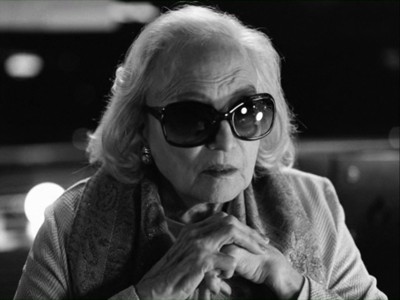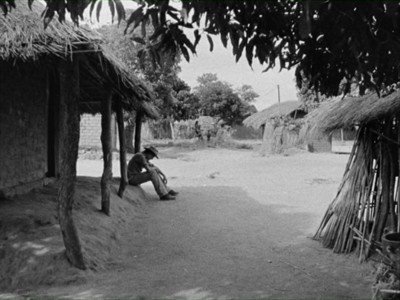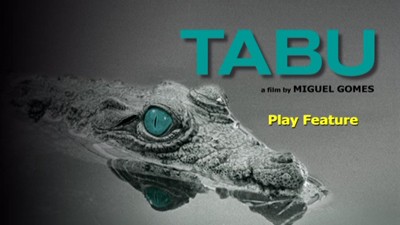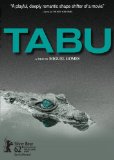| Reviews & Columns |
|
Reviews DVD TV on DVD Blu-ray 4K UHD International DVDs In Theaters Reviews by Studio Video Games Features Collector Series DVDs Easter Egg Database Interviews DVD Talk Radio Feature Articles Columns Anime Talk DVD Savant Horror DVDs The M.O.D. Squad Art House HD Talk Silent DVD
|
DVD Talk Forum |
|
|
| Resources |
|
DVD Price Search Customer Service #'s RCE Info Links |
|
Columns
|
|
|
Tabu (2012)
Lorber // Unrated // October 29, 2013
List Price: $29.95 [Buy now and save at Amazon]
The Film:
 Portuguese filmmaker Miguel Gomes casts an esoteric spell with his third feature-length film, Tabu, a tale of guilt, forbidden love, and mythical crocodiles set through the sweltering African landscape, with a mystery embedded within about the woman whose experiences prove to be the code to comprehending events in the past and present. Obstinate lyricism and an inclination towards silent-era homage styling somewhat in the vein of Chris Marker and Guy Maddin lend the film a strange, resonant core, hallmarked by rich motifs distilled from mischievous cinematic tricks: a restless older woman divulges her dreamscape in a lengthy one-sided diatribe, counterbalanced by an entire second half of the film free of dialogue aside from its languidly poetic narration. Its strangeness serves as a mask over what's ultimately a traditional exploration of the eventual overdramatic demons within one's past, making it a demanding exercise in ominous self-reference that's enhanced by Gomes' eye for compellingly soulful imagery.
Portuguese filmmaker Miguel Gomes casts an esoteric spell with his third feature-length film, Tabu, a tale of guilt, forbidden love, and mythical crocodiles set through the sweltering African landscape, with a mystery embedded within about the woman whose experiences prove to be the code to comprehending events in the past and present. Obstinate lyricism and an inclination towards silent-era homage styling somewhat in the vein of Chris Marker and Guy Maddin lend the film a strange, resonant core, hallmarked by rich motifs distilled from mischievous cinematic tricks: a restless older woman divulges her dreamscape in a lengthy one-sided diatribe, counterbalanced by an entire second half of the film free of dialogue aside from its languidly poetic narration. Its strangeness serves as a mask over what's ultimately a traditional exploration of the eventual overdramatic demons within one's past, making it a demanding exercise in ominous self-reference that's enhanced by Gomes' eye for compellingly soulful imagery.
After setting the film's tone with a downhearted movie within a movie, a tale of an African hunter driven to commit suicide in crocodile-infested waters because of a love affair, Tabu introduces the mystery of an elderly woman, Aurora (Laura Soveral), whose daily agitation concerns her neighbor, Pilar (Teresa Madruga), who's disappointed that a visiting nun won't be staying at her house. The first half of the film, gloomily entitled "Paradise Lost" and set in Lisbon, revolves around building curiosity towards Aurora and her standoffish African maid, Santa (Isabel Munoz), the same sort of curiosity that drives Pilar when she's not engaged in political protests and socializing with her artist friend (and willing suitor). Gomes' style makes this section a disjointed challenge, almost intentionally so: Aurora's long-winded and nonsensical explanation of her symbolic dream feeds into her struggles with assumed dementia and confusion, leaving only the uninformed point-of-views of Pilar and Santa to make sense of the film's cryptic, meandering objectives. Turns out, after Aurora's inquiry to find a man named Gian-Luca Ventura (Henrique Espirito Santo), it's quite intentional.
Director Gomes insists on keeping Aurora's mysteries well-obscured until the second half of Tabu, entitled "Paradise", where we're transported to '60s Africa at the edge of Mount Tabu just before the Portuguese Colonial war. The simmering political hostilities only serve as a backdrop for the complex love affair involving this version of Aurora (shrewdly captured by Ana Moreira) -- then married to a wealthy farmer -- unknown to the two women, told through calm, persistent narration from Gian-Luca Ventura with only the scattered pops of guns, splashes of water, as chirping insects as unassuming background noises alongside classic rock tunes. Enigmatic details buried within her ramblings begin to make sense during the flashback, as her nature as a calculated hunter and frigid individual outside of her tryst with Ventura (Carloto Cotta), an explorer with experiences in love and fame, becomes the film's compelling and evolving cipher. Gomes employs deeply expressive physical performances and ornate cinematography in place of actual dialogue between the characters, moving sluggishly at first until the film's unique heartrending sensuality engages the two lovers' character traits.
this version of Aurora (shrewdly captured by Ana Moreira) -- then married to a wealthy farmer -- unknown to the two women, told through calm, persistent narration from Gian-Luca Ventura with only the scattered pops of guns, splashes of water, as chirping insects as unassuming background noises alongside classic rock tunes. Enigmatic details buried within her ramblings begin to make sense during the flashback, as her nature as a calculated hunter and frigid individual outside of her tryst with Ventura (Carloto Cotta), an explorer with experiences in love and fame, becomes the film's compelling and evolving cipher. Gomes employs deeply expressive physical performances and ornate cinematography in place of actual dialogue between the characters, moving sluggishly at first until the film's unique heartrending sensuality engages the two lovers' character traits.
The peaks of Tabu's expressiveness lie in how director Gomes ethereally transports those observing the flashbacks -- whether it's the way they originally occurred or how they've manifest in Ventura's mind -- to a bygone era, achieving almost a documentary-like style amid subtle textural delights: playing table tennis in the rain, gazing upon a pet crocodile's scales, and making love underneath a mosquito net. On the other hand, this also feeds into one of the film's faults by simply ending "Paradise" without tying it back to the present era once Ventura's tale of secret rendezvous and romantic turmoil comes to a close. Instead, Gomes lets the climactic images painted by an old man's words to be the final deductions and catharsis points in the mystery built around Aurora, culminating in a pair of drawn-out and disparate blocks of exploratory character drama that leave one perplexed by the love affair's repercussions. Ultimately relying on meta reflections in the final moments of its distinctive and often ponderous ruminations about romance and fatalism, Tabu's resonance could benefit from more finality and consequence.
Video and Audio:
Somewhat predictably, Tabu employs two different visual aesthetics between time periods within its grayscale coloring and 1.33:1-framed aspect ratio: absolute lucidity for the modern era, and a grainy, textured vintage appearance for the '60s. This transfer from Adopt Films makes the most of the clarity in the contemporary sequences, where garment surfaces, skin textures, the wisps of smoke and light reflections in sunglasses reveal a tight grasp on detail. Once it shifts into the '60s, the disc handles the fine granules of the vintage look with a steady hand, capably preserving details in the tropical setting and in the weathered architecture to emerge. Contrast is rock-solid in both eras, with moderate black levels that are considerate of details within. Some damage can be spotted at times and whites could be a little brighter, but overall it's a very appealing transfer of modern black-and-white photography.
the clarity in the contemporary sequences, where garment surfaces, skin textures, the wisps of smoke and light reflections in sunglasses reveal a tight grasp on detail. Once it shifts into the '60s, the disc handles the fine granules of the vintage look with a steady hand, capably preserving details in the tropical setting and in the weathered architecture to emerge. Contrast is rock-solid in both eras, with moderate black levels that are considerate of details within. Some damage can be spotted at times and whites could be a little brighter, but overall it's a very appealing transfer of modern black-and-white photography.
There's very little to comment on in regards to the Dolby 2.0 Stereo track, since it's made up almost entirely of dialogue. In a few spots, the narration exhibits some pitch issues, but otherwise the various verbal delivery is strong, clear, and capably-balanced along the bass channel. The sounds of re-recorded classic '60s tunes reflect their vintage without any hiccups, while a few scant effects -- the shots of a rifle, the gentle splash of water, the sound of tribal yells -- handle their clarity and responsiveness to the environment relatively well. English subs are burned into the image.
Special Features:
Not a thing.
Final Thoughts:
Director Miguel Gomes distills passion, despondency, and regret into his visually captivating drama Tabu, offering poetic glimmers within each chapter of his two-part story, chronologically flipped and separated by nearly half a lifetime. The trouble comes in how the two sides of the story relate to one another on a thematic level instead of purely contextual, something needed after the slow-moving, casually eloquent and connective exploration of Aurora in both time periods. It's beautifully-crafted and modestly creative in its construction, but the slumberous pacing and lack of synergy between the disparate blocks of time -- and the ultimately fruitless character studies in the contemporary era -- make this one merely worth a Rental.
Thomas Spurlin, Staff Reviewer -- DVDTalk Reviews | Personal Blog/Site
 Portuguese filmmaker Miguel Gomes casts an esoteric spell with his third feature-length film, Tabu, a tale of guilt, forbidden love, and mythical crocodiles set through the sweltering African landscape, with a mystery embedded within about the woman whose experiences prove to be the code to comprehending events in the past and present. Obstinate lyricism and an inclination towards silent-era homage styling somewhat in the vein of Chris Marker and Guy Maddin lend the film a strange, resonant core, hallmarked by rich motifs distilled from mischievous cinematic tricks: a restless older woman divulges her dreamscape in a lengthy one-sided diatribe, counterbalanced by an entire second half of the film free of dialogue aside from its languidly poetic narration. Its strangeness serves as a mask over what's ultimately a traditional exploration of the eventual overdramatic demons within one's past, making it a demanding exercise in ominous self-reference that's enhanced by Gomes' eye for compellingly soulful imagery.
Portuguese filmmaker Miguel Gomes casts an esoteric spell with his third feature-length film, Tabu, a tale of guilt, forbidden love, and mythical crocodiles set through the sweltering African landscape, with a mystery embedded within about the woman whose experiences prove to be the code to comprehending events in the past and present. Obstinate lyricism and an inclination towards silent-era homage styling somewhat in the vein of Chris Marker and Guy Maddin lend the film a strange, resonant core, hallmarked by rich motifs distilled from mischievous cinematic tricks: a restless older woman divulges her dreamscape in a lengthy one-sided diatribe, counterbalanced by an entire second half of the film free of dialogue aside from its languidly poetic narration. Its strangeness serves as a mask over what's ultimately a traditional exploration of the eventual overdramatic demons within one's past, making it a demanding exercise in ominous self-reference that's enhanced by Gomes' eye for compellingly soulful imagery. After setting the film's tone with a downhearted movie within a movie, a tale of an African hunter driven to commit suicide in crocodile-infested waters because of a love affair, Tabu introduces the mystery of an elderly woman, Aurora (Laura Soveral), whose daily agitation concerns her neighbor, Pilar (Teresa Madruga), who's disappointed that a visiting nun won't be staying at her house. The first half of the film, gloomily entitled "Paradise Lost" and set in Lisbon, revolves around building curiosity towards Aurora and her standoffish African maid, Santa (Isabel Munoz), the same sort of curiosity that drives Pilar when she's not engaged in political protests and socializing with her artist friend (and willing suitor). Gomes' style makes this section a disjointed challenge, almost intentionally so: Aurora's long-winded and nonsensical explanation of her symbolic dream feeds into her struggles with assumed dementia and confusion, leaving only the uninformed point-of-views of Pilar and Santa to make sense of the film's cryptic, meandering objectives. Turns out, after Aurora's inquiry to find a man named Gian-Luca Ventura (Henrique Espirito Santo), it's quite intentional.
Director Gomes insists on keeping Aurora's mysteries well-obscured until the second half of Tabu, entitled "Paradise", where we're transported to '60s Africa at the edge of Mount Tabu just before the Portuguese Colonial war. The simmering political hostilities only serve as a backdrop for the complex love affair involving
 this version of Aurora (shrewdly captured by Ana Moreira) -- then married to a wealthy farmer -- unknown to the two women, told through calm, persistent narration from Gian-Luca Ventura with only the scattered pops of guns, splashes of water, as chirping insects as unassuming background noises alongside classic rock tunes. Enigmatic details buried within her ramblings begin to make sense during the flashback, as her nature as a calculated hunter and frigid individual outside of her tryst with Ventura (Carloto Cotta), an explorer with experiences in love and fame, becomes the film's compelling and evolving cipher. Gomes employs deeply expressive physical performances and ornate cinematography in place of actual dialogue between the characters, moving sluggishly at first until the film's unique heartrending sensuality engages the two lovers' character traits.
this version of Aurora (shrewdly captured by Ana Moreira) -- then married to a wealthy farmer -- unknown to the two women, told through calm, persistent narration from Gian-Luca Ventura with only the scattered pops of guns, splashes of water, as chirping insects as unassuming background noises alongside classic rock tunes. Enigmatic details buried within her ramblings begin to make sense during the flashback, as her nature as a calculated hunter and frigid individual outside of her tryst with Ventura (Carloto Cotta), an explorer with experiences in love and fame, becomes the film's compelling and evolving cipher. Gomes employs deeply expressive physical performances and ornate cinematography in place of actual dialogue between the characters, moving sluggishly at first until the film's unique heartrending sensuality engages the two lovers' character traits. The peaks of Tabu's expressiveness lie in how director Gomes ethereally transports those observing the flashbacks -- whether it's the way they originally occurred or how they've manifest in Ventura's mind -- to a bygone era, achieving almost a documentary-like style amid subtle textural delights: playing table tennis in the rain, gazing upon a pet crocodile's scales, and making love underneath a mosquito net. On the other hand, this also feeds into one of the film's faults by simply ending "Paradise" without tying it back to the present era once Ventura's tale of secret rendezvous and romantic turmoil comes to a close. Instead, Gomes lets the climactic images painted by an old man's words to be the final deductions and catharsis points in the mystery built around Aurora, culminating in a pair of drawn-out and disparate blocks of exploratory character drama that leave one perplexed by the love affair's repercussions. Ultimately relying on meta reflections in the final moments of its distinctive and often ponderous ruminations about romance and fatalism, Tabu's resonance could benefit from more finality and consequence.
Video and Audio:
Somewhat predictably, Tabu employs two different visual aesthetics between time periods within its grayscale coloring and 1.33:1-framed aspect ratio: absolute lucidity for the modern era, and a grainy, textured vintage appearance for the '60s. This transfer from Adopt Films makes the most of
 the clarity in the contemporary sequences, where garment surfaces, skin textures, the wisps of smoke and light reflections in sunglasses reveal a tight grasp on detail. Once it shifts into the '60s, the disc handles the fine granules of the vintage look with a steady hand, capably preserving details in the tropical setting and in the weathered architecture to emerge. Contrast is rock-solid in both eras, with moderate black levels that are considerate of details within. Some damage can be spotted at times and whites could be a little brighter, but overall it's a very appealing transfer of modern black-and-white photography.
the clarity in the contemporary sequences, where garment surfaces, skin textures, the wisps of smoke and light reflections in sunglasses reveal a tight grasp on detail. Once it shifts into the '60s, the disc handles the fine granules of the vintage look with a steady hand, capably preserving details in the tropical setting and in the weathered architecture to emerge. Contrast is rock-solid in both eras, with moderate black levels that are considerate of details within. Some damage can be spotted at times and whites could be a little brighter, but overall it's a very appealing transfer of modern black-and-white photography. There's very little to comment on in regards to the Dolby 2.0 Stereo track, since it's made up almost entirely of dialogue. In a few spots, the narration exhibits some pitch issues, but otherwise the various verbal delivery is strong, clear, and capably-balanced along the bass channel. The sounds of re-recorded classic '60s tunes reflect their vintage without any hiccups, while a few scant effects -- the shots of a rifle, the gentle splash of water, the sound of tribal yells -- handle their clarity and responsiveness to the environment relatively well. English subs are burned into the image.
Special Features:
Not a thing.
Final Thoughts:
Director Miguel Gomes distills passion, despondency, and regret into his visually captivating drama Tabu, offering poetic glimmers within each chapter of his two-part story, chronologically flipped and separated by nearly half a lifetime. The trouble comes in how the two sides of the story relate to one another on a thematic level instead of purely contextual, something needed after the slow-moving, casually eloquent and connective exploration of Aurora in both time periods. It's beautifully-crafted and modestly creative in its construction, but the slumberous pacing and lack of synergy between the disparate blocks of time -- and the ultimately fruitless character studies in the contemporary era -- make this one merely worth a Rental.
|
| Popular Reviews |
| Sponsored Links |
|
|
| Sponsored Links |
|
|
| Release List | Reviews | Shop | Newsletter | Forum | DVD Giveaways | Blu-Ray | Advertise |
|
Copyright 2024 DVDTalk.com All Rights Reserved. Legal Info, Privacy Policy, Terms of Use,
Manage Preferences,
Your Privacy Choices | |||||||















